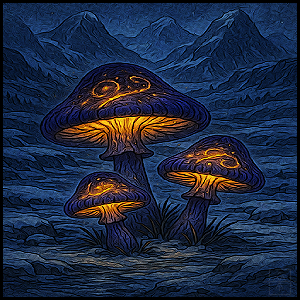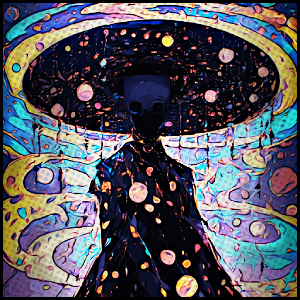Leymen's Tongue
... the root form of an original language inspired by ancient practices!
"What Aelven Script or Folk Runes were to those Cultures, their own tongue was, to the Leymen, something familiar. The early Proto-Humans had consumed those very mushrooms that gave form to the more advanced languages. Yet their instincts for this secret language came naturally, organically. Through it, the Leyman language grew from the Roots of Origins as a common thread between each Culture."
Through an ancient, Spiritual network, the Roots of Origin, many Cultures developed their early languages around the sacred Words granted by ingesting Wordcaps. This unique mushroom contains the essence of a Word and grants the consumer understanding of its meaning. Often, mundane or ordinary, sometimes extraordinary, but these phonetics otherwise formed the root for a universal dialect transcending Cultural divide. Etymologists refer to it as Leyman. The ancestors called it Leymen's Tongue.

Magical Wordcaps
While the older Cultures had adapted the language into their own through rites and sacred revelations, the many fringe Cultures developed it from adaptation and necessity. By listening closely, they too inherited the Words spoken by murmuring mushrooms.
Origin & Significance

Sahyu, Lord of Rituals,
as Zayul the Speaker
as Zayul the Speaker
While Leymen's Tongue isn't the first multi-Cultural language, it was the first to become commonly distributed throughout the Ice Age. The early Proto-Humans, in particular, found their first Words by interpreting the Spiritual entity they referred to as Zayul the Speaker.
Known by many names, he taught the Words just as he had always done through the Roots of Origin. Wordcaps became the initial alphabet of Proto-Humans. Mimicry was granted meaning, and a simple language formed honoring the truth of things to simply be what they were.
Known by many names, he taught the Words just as he had always done through the Roots of Origin. Wordcaps became the initial alphabet of Proto-Humans. Mimicry was granted meaning, and a simple language formed honoring the truth of things to simply be what they were.
Leymen's Tongue was first referred to as such by the Sijinn that recognized the speech patterns amongst the early Cultures and mistakenly considered them as travelers too.
"Speak with breath; not noise."
Grammar & Syntax
Leymen's Tongue is a simple, non-moderated language, that uses short sentence structures. There are no contractions of speech, and identity is expressed with simple gender-expressive pronouns. Individual Cultures put more or less emphasis on roles and titles in identity expression, such as the Aelves. For example, instead of saying, "I walk", an Aelf may say, "The Hermit walks."
Words in Leymen may have associative metaphorical meanings, which might change the outcome of a statement. For example, "The bone breaks" is given with context; this can either be a threat or an admonition, given circumstances. Symbolism is seeded from the original Root Memory from the Wordcap or from oral tradition. Adjectives and adverbs are minimal, emphasizing nouns and action.
Leyman Runic
The written form of Leymen's Tongue was a graven script using the alphabet derived from Wordcaps. Sentences are usually constructed with 3-5 runes positioned vertically or horizontally, read left to right, bottom to top. Leyman's Grid is the form used to write stories. Carved on a square or rectangular plate of clay or stone, these artifacts were often found in burial sites or old cave-dwellings, where they had recorded excerpts from the early Cultures. Grids are often named after their writer, signed or marked in runic. The first Leyman's Grid is widely considered to be a receipt of purchase between traders."Is beyond the Pale."
Idioms & Phrases
During the Ice Age, many of the common idioms and tropes were associated with their natural environment or survival. References to warmth and comfort were common.
- Cold. No good for Crops.
- Bold fools do not grow old.
- Bury it in snow.
- Two rocks with no spark.
- Melting ice, drinking water.
- It exposes roots.
- A mouth full of snow.
- Have you eyes?
- Eat rocks.
- Word lacks warmth.
- Bad crop season/ yield.
- Warning vs arrogance.
- To abandon something.
- A bad relationship.
- Effort yielding results.
- One clearly exposed.
- Soft or out-spoken person.
- Question of disbelief.
- Rude dismissal.
- A lack of conviction.
"Ohae! Sahyu isude! (Sahyu Lives, Aelven)
Pa-Haoman speaks Leymen's Tongue? Ha-o! Hello! Aelf, yes! Friend!
See, Aelf exposes root. Has Leyman food? Hungry Aelf. Could trade?
This one has Fire and Icing Silks. Both, fed and warm. Dream tonight. Please?"
Legacy & Social Impact
Leymen's Tongue grew from each Cultures' interactions not just with the Wordcaps, but also with each other. Multi-cultural Kinship Tribes formed around mutual needs of survival. As a Common language between them, Leyman bridged linguistic gaps that earlier civilizations, such as the Folk, Aelves, and Sijinn, had already overcame by the Time Proto-Humans formed cave-dwelling societies.
Their understanding of the language was aided by the Kin Folk, who used their understanding of root Words to help form the connections between sound and World. With written words and an alphabet, numbers, time-keeping, and an adaptation of Calendar systems, Leymen's Tongue remained relevant, inevitably evolving into the wide-spread form of Common spoken across Pathon.
The Common Tongue
Demographics
Region:
Mystomythia
Established:
Ice Age
Evolution:
New Leymen's
Mystomythia
Established:
Ice Age
Evolution:
New Leymen's
Status:
Common
Root:
Original
Origin:
P-Human
Common
Root:
Original
Origin:
P-Human
Lexicography
Literacy:
Common Primary
or Secondary Language
Common Primary
or Secondary Language
Leytongue:
Basic spoken form of Leyman.
Leyman Runic:
Scribed or engraved, several Words on blocks or plates. Often called a Leyman's Grid.
Basic spoken form of Leyman.
Leyman Runic:
Scribed or engraved, several Words on blocks or plates. Often called a Leyman's Grid.
Variations
Folk Leytongue:
Smatters Folk, heavy Leyman.
Aelven Leytongue:
Heavy Aelven, accents in Leyman.
Sijinn Leytongue:
Influenced by individual Tribes.
Smatters Folk, heavy Leyman.
Aelven Leytongue:
Heavy Aelven, accents in Leyman.
Sijinn Leytongue:
Influenced by individual Tribes.
- Air:
Gentle Sijinn; aside Leyman. - Earth:
Raspy Leyman; deep Sijinn. - Fire:
Energetic Leyman; fiery Sijinn. - Water:
Quiet Leyman; fluid Sijinn.
References
Mentioned Articles
Myth
All Arc Sagas' © content, including but not limited to original assets, mechanics, settings, is the intellectual property of Myth-X, unless attributed otherwise.
Arc Sagas' universe and the Arx-Core D10's System (TTRPG) are © Myth-X, 2023–2025. AI assets generated via perchance.org or Elara-AI; all AI Images edited, watermarked by Myth-X. Iconography sourced from RPG-Awesome or Font Awesome. Content is hosted and displayed via World Anvil.
All rights reserved. Redistribution or commercial use without express permission is prohibited.
Arc Sagas' universe and the Arx-Core D10's System (TTRPG) are © Myth-X, 2023–2025. AI assets generated via perchance.org or Elara-AI; all AI Images edited, watermarked by Myth-X. Iconography sourced from RPG-Awesome or Font Awesome. Content is hosted and displayed via World Anvil.
All rights reserved. Redistribution or commercial use without express permission is prohibited.



Eat rocks lol I love it!
Thank you! I like to think some things are so embedded in the Cultural bedrock that it just is; some things are just so good they may never change lol ^^
True! Why change something so perfect?